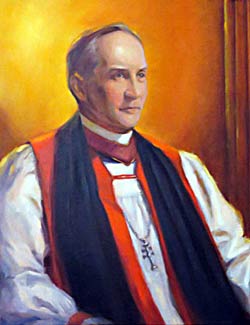Readings:
Collect: (Proposed by the Episcopal Church in South Carolina)
God of truth and sacrifice, we give thanks for your servant William Alexander Guerry, who, like the church's first martyr, gave witness to your liberating gospel and echoed Christ's healing words of forgiveness. May we also seek your truth as we offer ourselves in obedience to the same. All this we pray through him who is forever the bishop and reformer of our souls, Jesus Christ our Savior. Amen.
This commemoration is a 2018 addition to A Great Cloud of Witnesses.
Return to Lectionary Home Page
Webmaster: Charles Wohlers
Last updated: 7 May 2019
WILLIAM ALEXANDER GUERRY
BISHOP, 1928
 The Right Reverend William Alexander Guerry (July 7, 1861 – June 9, 1928) was eighth bishop of the Episcopal Diocese of South Carolina.
The Right Reverend William Alexander Guerry (July 7, 1861 – June 9, 1928) was eighth bishop of the Episcopal Diocese of South Carolina.
He was consecrated bishop coadjutor on September 15, 1907, and became the eighth diocesan bishop of the Diocese of South Carolina on April 22, 1908. Prior to this he served as a parish priest and then as Chaplain and Professor of Homiletics and Pastoral Theology at the University of the South.
Bishop Guerry’s theology of the broadness of the Church led him to propose, in 1914, the election of a black suffragan bishop for South Carolina to be responsible for the ministry to black Episcopalians, and to insure that all people, regardless of race, were part of the community of Christ in the diocese The alternative, which unfortunately prevailed, was to separate the African American community into a “Missionary District for Negroes”, an arrangement that continued until the after the mid-20th century when that segment of the Christian community was finally given an equal place in the community.
The bishop’s life on earth ended on June 9, 1928, five days after he was shot in his office at St. Philip’s Church by a priest who had attacked the bishop’s position on advancing racial equality in South Carolina, and especially on his proposal to install a black suffragan bishop in the diocese. The priest who shot the bishop had written that the bishop, given his way, would root out the principle of white supremacy in the south. So, overtaken by hatred, and perhaps other mental problems, he fired the shot that killed the bishop and then turned the gun on himself, taking his own life.
from Wikipedia and the Episcopal Church in South Carolina
Project Canterbury has a numbder of his writings.